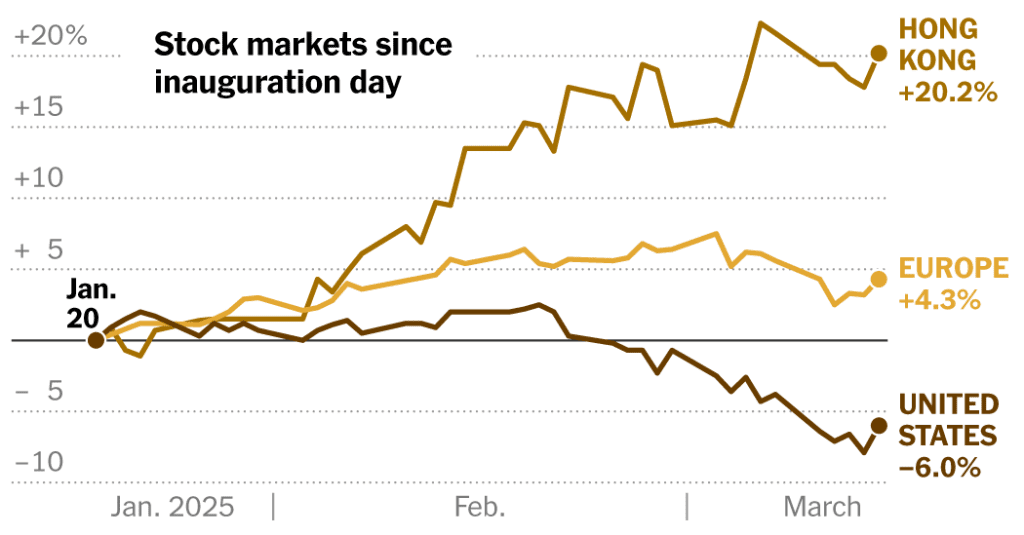President Trump has vowed to usher in an era of American exceptionalism through policies that prioritize the United States over other nations.
However, the initial actions taken by Mr. Trump during his presidency have adversely impacted the American stock market.
The S&P 500, which had previously outperformed international stock indexes, is now lagging behind significant markets in Europe and China, as investors are reallocating their funds globally.
Since Mr. Trump’s inauguration, the S&P 500 has decreased by 6 percent, whereas Germany’s Dax index has risen by 10 percent and the broader Stoxx 600 index for Europe has seen an increase of over 4 percent. Other U.S. indexes have performed even worse as European markets benefit from anticipated military spending following Trump’s insistence on increased defense contributions from European nations.
The Hang Seng Index in Hong Kong has surged, increasing by over 20 percent since Trump’s inauguration due to economic stimulus efforts by the Chinese government. Meanwhile, Mexico’s IPC index, focused on domestic markets and resilient to Trump’s hefty tariffs, has grown by 5 percent.
With American markets experiencing volatility from uncertainties regarding Trump’s tariff strategies and substantial government cuts, investment advisors have started to recommend clients diversify into international markets.
“It is definitely a time to consider options outside the U.S.,” noted Jitania Kandhari, deputy chief investment officer at Morgan Stanley Investment Management, who has observed an increase in client discussions about international stock investments.
Even global markets that have faced declines have still outperformed the S&P 500. For instance, the FTSE All-World index fell by 2.9 percent since the inauguration, weighed down by U.S.-listed stocks, while Canada’s TSX index dropped 2 percent and Japan’s Nikkei 225 decreased by 3.6 percent.
Recently, Wall Street produced numerous bank research reports and client presentations advocating for a shift away from U.S. investments. One such report from J.P. Morgan’s Bruce Kasman was titled, “Respect resilience, fade U.S. exceptionalism, and worry about policy shocks.”
Brad Rutan, a market strategist at MFS Investment Management, also noted the potential for greater gains outside the U.S., asserting, “There is significant room for international equities now.”
In the past week, investors withdrew funds from U.S. stock-focused investments for the first time this year, according to data from EPFR Global, amounting to $2.5 billion compared to an influx of around $100 billion in the first nine weeks of 2025.
While some traders react swiftly to market developments, others, particularly long-term investors like pension funds and endowments, may take months to adjust their portfolios.
If the trend of pulling funds from U.S. stocks continues, it may intensify the selling pressure that recently pushed the S&P 500 into correction territory, defined as a decline exceeding 10 percent from its peak.
Given the vastness of U.S. markets, a total withdrawal by foreign investors is unlikely, Kandhari remarked, “but any shift can certainly cause market fluctuations.”
This recent capital withdrawal comes after a time when the U.S. stock market was highly regarded globally, attracting foreign investors seeking better returns than those available in their local markets.
In 2024, approximately $420 billion flowed into funds that target U.S. stocks, boosting major indexes and contributing to the growth of several significant technology companies.
Many investors maintain a positive outlook on U.S. stocks in the long run and believe they will eventually surpass foreign stocks.
While government spending in Europe may drive growth, this upward trend could stem from geopolitical fears rather than robust economic health. Furthermore, if the U.S. experiences an economic downturn, it is likely that the rest of the world would not be shielded from its effects.
“I believe this uncertainty will eventually settle, and the U.S. will still hold advantages that Europe and other countries do not possess,” stated Paul Christopher, head of global market strategy at Wells Fargo Investment Institute.
Other investors are questioning whether this moment marks a potential shift away from the historically dominant trend of U.S. exceptionalism in financial markets.



